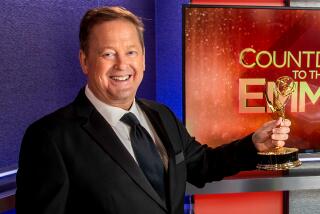Phil Kerby; Times Editorial Writer Won Pulitzer Prize
Phil Kerby, canny Pulitzer Prize-winning editorial writer and columnist for the Los Angeles Times, has died. He was 81.
Kerby, whose pithy liberal opinions peppered the newspaper from 1971 to 1985, died Wednesday night in Cedars-Sinai Medical Center of a heart attack. He had suffered from Parkinson’s disease and emphysema for many years, and had recently been in a coma and had pneumonia, his family said.
“There is no such thing as freedom if you can’t say what you please, hear what you please and read what you please,” Kerby commented when he won the Pulitzer in 1976.
Although Kerby ended his education at the high school level, he was regarded as highly self-educated and extremely bright. At the time Kerby won the Pulitzer, then-Publisher Otis Chandler saluted him: “You have raised the intellectual level of this newspaper.”
Anthony Day, a former editor of The Times editorial pages who hired Kerby, said upon learning of his death: “Phil was a small man, so slight that you might think a brisk breeze could blow him down the street. But he had a strong and penetrating mind and he wrote in a fluid English that was uncommonly graceful and sinewy.
“He was a proud liberal who had and forcefully expressed a profound belief that government officials would, if not checked, make mischief with the constitutional liberties of the American people,” Day said.
Philip P. Kerby grew up in Pueblo, Colo., and attended high school there, then moved directly to a reporter’s job on the Pueblo Chieftain. He later worked for the Denver Post, as a radio newsman, and as editor of Rocky Mountain Life, a magazine he started in Denver.
In 1949, Kerby persuaded Gifford Phillips, scion of a wealthy Denver family, to fund a public affairs magazine in Los Angeles, which he named Frontier. The magazine, which attracted such contributors as Bertrand Russell, Carey McWilliams, Jessica Mitford, Dalton Trumbo and Peter Bogdanovich, became a strident critic of McCarthyism.
“Phil was an FDR Democrat,” said his wife, former Time magazine writer Elizabeth Poe Kerby, “and he took a classic civil liberties position on the developing witch hunt of the ‘40s, ‘50s and ‘60s, arguing in many public forums throughout California as well as the editorial columns of Frontier that the Constitution of the U.S. guaranteed the right of (Sen. Joseph) McCarthy’s many victims to think what they pleased with impunity.”
One of Frontier’s major stories showed in 1954 that Hollywood motion picture studios had expanded their blacklist from the original “Hollywood Ten” to about 300 people.
Kerby became associate editor of the Nation when Frontier merged with that magazine in 1967.
Joining The Times editorial board in 1971, he became a specialist in criminal justice, governmental censorship and secrecy. He won the Pulitzer for a series of editorials opposing a proposed revision of the federal criminal code, which would have, among other things, made the counseling of anyone against the military draft a criminal offense.
Kerby wrote forcefully against censorship of trial proceedings and other governmental functions, once telling New York’s Village Voice: “Censorship is the strongest drive in human nature. Sex is a weak second.”
The soft-spoken Kerby was regarded by fellow staff members as a man of wry wit and compassionate regard for others, regardless of their political persuasion. He often surprised colleagues by coming down on the side of someone unexpected, but he always sided with the rights of individuals.
“The Earl Warren court,” he said in 1976, “really led this country to a new realization that the individual was the important thing.”
Among Kerby’s many awards was the 1983 Public Service award from the State Bar of California, granted “for distinguished reporting on the administration of justice.”
Kerby is survived by his wife, whom he married in 1953; his son, David, a student at UC Berkeley, and two brothers, Howard, of Salida, Colo., and Louis, of Denver.
A memorial service for Kerby will be at 2 p.m. May 21, at All Saints Episcopal Church in Beverly Hills.
More to Read
Sign up for Essential California
The most important California stories and recommendations in your inbox every morning.
You may occasionally receive promotional content from the Los Angeles Times.










![[20060326 (LA/A20) -- STATING THE CASE: Marchers organized by unions, religious organizations and immigrants rights groups carry signs and chant in downtown L.A. "People are really upset that all the work they do, everything that they give to this nation, is ignored," said Angelica Salas of the Coalition of Humane Immigrant Rights. -- PHOTOGRAPHER: Photographs by Gina Ferazzi The Los Angeles Times] *** [Ferazzi, Gina -- - 109170.ME.0325.rights.12.GMF- Gina Ferazzi/Los Angeles Times - Thousands of protesters march to city hall in downtown Los Angeles Saturday, March 25, 2006. They are protesting against House-passed HR 4437, an anti-immigration bill that opponents say will criminalize millions of immigrant families and anyone who comes into contact with them.]](https://ca-times.brightspotcdn.com/dims4/default/34f403d/2147483647/strip/true/crop/1983x1322+109+0/resize/840x560!/quality/75/?url=https%3A%2F%2Fcalifornia-times-brightspot.s3.amazonaws.com%2Fzbk%2Fdamlat_images%2FLA%2FLA_PHOTO_ARCHIVE%2FSDOCS%2854%29%2Fkx3lslnc.JPG)